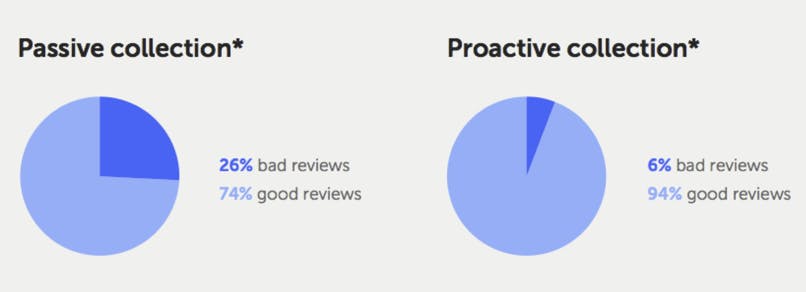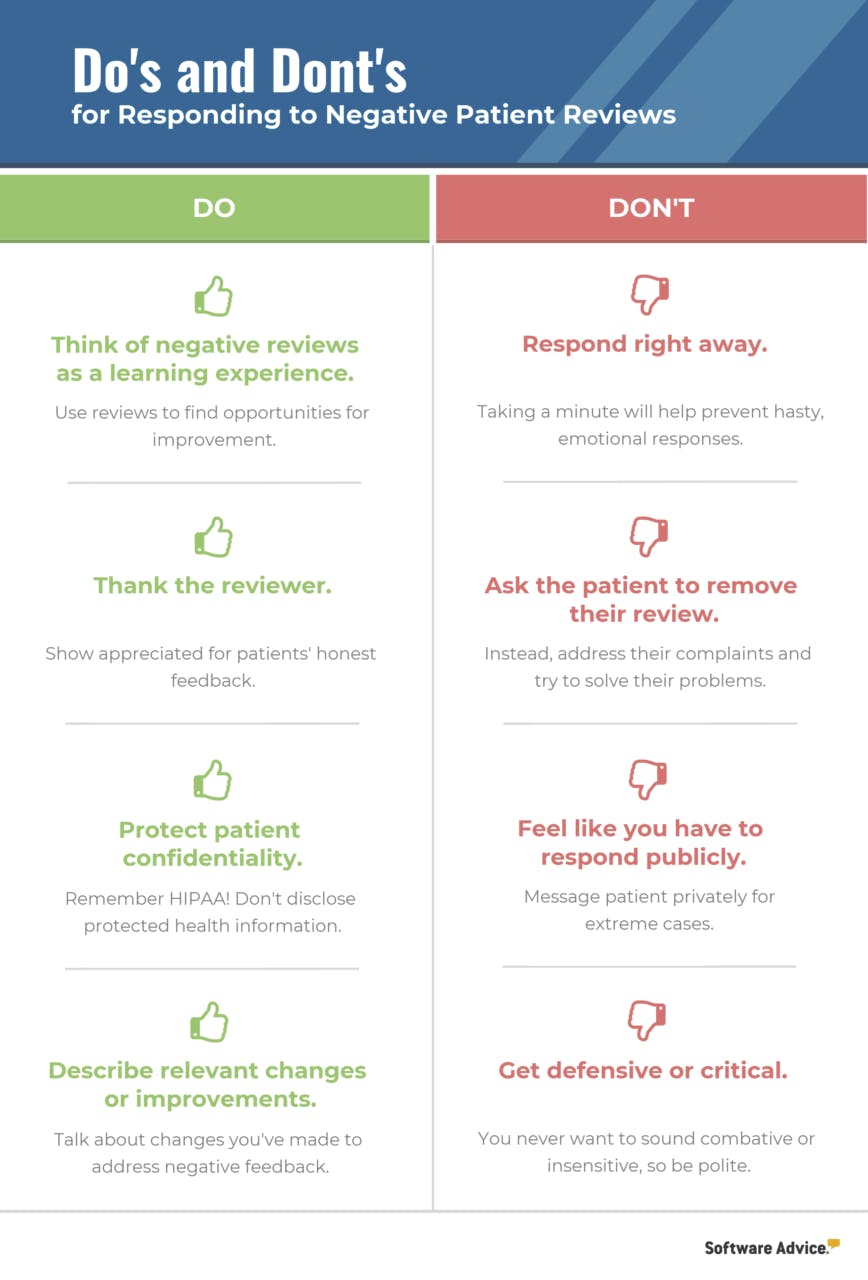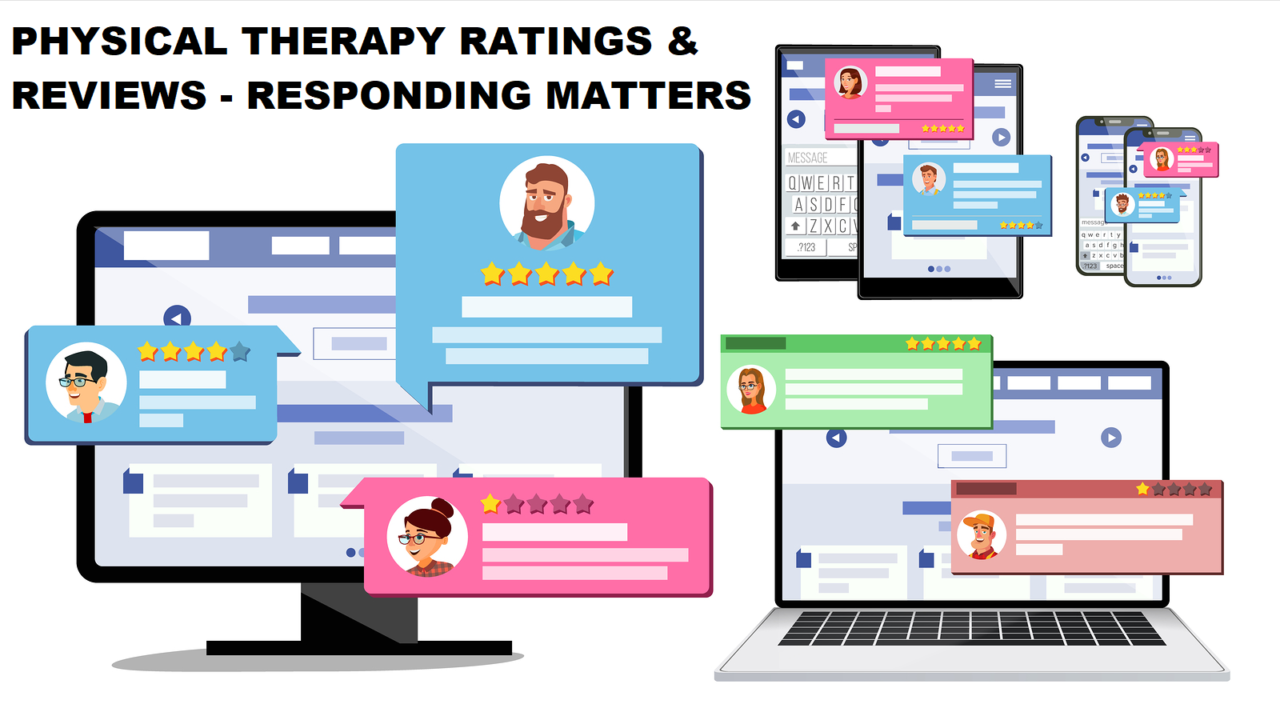Here are some thoughts about negative physical therapy ratings and reviews, why they aren’t so bad, how and why you should respond to them, as well as positive reviews too.
Before I get into it, you should know that an occasional negative review is actually beneficial. Don’t believe it? Check this piece out that references 5 benefits of a negative review
Disclaimer, we aren’t HIPAA experts or attorneys. For legal questions, please consult with a compliance company or your own attorney.
HIPAA and Responding to Physical Therapy Ratings and Reviews
A cursory Google search with various search terms related to HIPAA and responding to reviews resulted in the following conclusions:
- If a patient has already revealed his or her personal health information in his or her online review Doesn’t this authorize a provider to acknowledge that the person is a patient? After all, this individual has already admitted this in the review. The answer is “no.” Per HIPAA regulations, regardless of what a patient says in his or her review, you are NOT authorized to release any private health information in your response. According to Deven McGraw, the deputy director of health information privacy at the Department of Health and Human Services Office for Civil Rights (OCR). https://www.reputationdefender.com/blog/doctors/online-reviews-and-hipaa-what-you-need-to-know-about-responding-to-patient-reviews
- Numerous responses to Google, Yelp, and Facebook ratings and reviews include Protected Health Information.
- There seems to be no legal precedent that we could find related to litigation, fines, or complaints regarding a response from a physical therapy practice to a positive or negative review.
- There are legal cases surrounding physicians’, chiropractors’, and dentists’ responses to negative reviews.
- In a 2016 ProPublica post, Yelp gave ProPublica access to their ratings and reviews for study and the authors noted: “We identified more than 3,500 one-star reviews (the lowest) in which patients mention privacy or HIPAA. In dozens of instances, responses to complaints about medical care turned into disputes over patient privacy.”
- HIPAA Journal made no reference to fines related to responses to negative online reviews in this post.
- Common sense suggests that you shouldn’t discuss the patient’s case at all in a public venue such as ratings and review sites.
- Responding to positive reviews in such a way that it acknowledges that the review was a patient, while apparently a HIPAA violation, hasn’t resulted in any negative consequences for providers.
- Most patients write positive reviews so, you won’t be responding to many negative patient reviews. Reference
- Best practices are to respond to reviews with generic language and a focus on office policies, e.g. thank the reviewer but don’t acknowledge they were are patient.
Background – Physical Therapy Ratings & Reviews on Your Website vs. Online Directories
I define online reviews [when I say reviews, I am implying both a star rating and text review] as those posted to directory sites, such as Google, Yelp, and Facebook to name a few. Our data, from over 2000 PT websites, indicates that Google is the first place that most prospective patients see you online; therefore, online reviews at Google matter the most and you should have a system to capture them. Like many other systems, E-rehab has a great system (we have many clients with over 100 Google reviews) that either directs patients to the proper place to write a review on Google My Business or to write a review for their website.
I speak to many practice owners that are so focused on Google, Yelp, and Facebook reviews that they forget that the second most common way prospective patients get to your website is by directly going to it…in other words, they type your web address/URL into their browser. For this exact reason, you want to make sure that you have reviews on your home page, not only Google, Yelp, and Facebook.
Jay Baer, marketing and customer service expert, articulates this well in his post:
But there’s a second type of review that is just as important: first-party reviews. These are the reviews that are on YOUR website. They’ve been common on e-commerce websites for years, but are now popping up on retail, restaurant, and professional services sites.
You’re going to see more and more first-party reviews because they help convince customers late in the funnel, by ratifying their decision to make your enterprise the finalist for their purchase.
Bad Reviews Aren’t So Bad but You Must Collect Reviews from All of Your Clients
In a study by reevoo.com (that’s worth the download), they noted that bad reviews are helpful to consumers in the following ways:
Consumers want complete information
We all know that no product or service is completely perfect. Consumers want to know the few negatives so they can weigh them up against all the good points and make a fully informed decision.Consumers don’t always agree on ‘bad’ points
A bad point to one purchaser is often irrelevant to another – and can even be an advantage. One guest could hate a hotel because there were ‘too many’ children but, to someone planning a family holiday, that’s an advantage.Consumers don’t look at reviews in isolation
The mere presence of bad reviews isn’t enough to put most consumers off: it’s the ratio of good to bad that matters. A few bad reviews carry much less weight with readers when they appear alongside dozens or hundreds of good reviews.Consumers notice when there are no bad reviews
Shoppers are suspicious when the reviews don’t include any complaints. They won’t assume your product or service is just that good – they’ll assume it’s so bad you have to censor customer feedback.
If you read the ebook, you’ll notice that it is primarily about products, not services, or specifically physical therapists. Nevertheless, their conclusions on how consumers utilize review information is likely to apply to the PT private practice space. At the very least, it should give practice owners better perspective on the value of reviews to consumers and alleviate some of the anxiety when you receive a bad review.
But, you don’t want to just sweep a bad review under the carpet. You need to take action.
Responding to Negative and Positive Physical Therapy Ratings & Reviews is Important
It’s important to respond to reviews because as much as anything, you are writing the response for other people that will be reading the reviews.
According to Software Advice’s 2019 updated survey, patients would like providers to respond to reviews. However, do so with care.
The Importance of Healthcare Providers (PTs) Responding To Negative Reviews
Below are tips, that when followed, may keep the patient coming back and prevent prospects that have examined your reviews from choosing another practice instead of yours.
1) Respond fast – 51.7% of consumers expect businesses to respond to their negative review within seven days. The quicker the response, the better. Patients that see you respond quickly to their issue helps them to understand that you are a customer-service oriented practice. By delaying a response, you risk never getting any business from not only that customer, but future patrons as well. Prospects who read these reviews and see you respond in a genuine, caring way are very likely to still choose you because they see you are actively involved with making sure your patients’ concerns are addressed.
Case Study: in 2018, I helped several clients respond to negative physical therapy ratings and reviews. Two clients that I helped said that a patient read the response and chose their practice. Not to say that I have some magic formula to respond, it was more about being polite and timely.
2) When you respond, don’t be defensive or argumentative – First, thank them for letting you know there was an issue. Then, offer your sincere apology that it even happened at all. Tell them that this is not typical of your company and that you are giving this issue your utmost attention. If possible ask them to contact you so you can resolve it as quickly as possible. How you resolve the issue is up to you.
Some patients just want to be heard. Others will try to extort money from you, or in other words, will tell you they are going to write a negative review if you don’t forgive their copay or co-insurance. In these cases, there’s little you can do to change their mind, so you have live with it. Nevertheless, a courteous, timely, HIPAA compliant response is still a good idea.
3) Ask Them to Update Their Review – If you were able to successfully resolve an issue offline, ask the patient to return to the directory site and update their review! Don’t try to post yourself stating that the issue was resolved. It is best coming from the patient. They may not update their response, but it does no harm to at least ask and may go a long way to, once again, increase your reputation online!
Still others are just unhappy people and that’s okay. As I indicated earlier, having a few bad reviews isn’t a bad thing. In fact, when it comes to purchasing many goods and services, maximum purchases occur from vendors when their online reputation is less than five stars. I haven’t seen that play out in the rehabilitation profession but if you have a very large volume of reviews, >100, it could be an advantage.
4) Responding to Reviews is a Differentiator – in a large data study by reviewtrackers.com (worth the read), they indicated that 63% of consumers never hear back after they post a negative review. In a cursory inspection of 50 different physical therapy practices, we too noticed that neither positive or negative reviews received responses from PT practices most of the time.
5) Responding to Positive Reviews is an SEO Factor – Finally, why bother to respond to positive reviews? Google confirms that it helps with local search rankings.
In a statement released by Google on a Google My Business support page titled Improve your local ranking on Google, they stated:
…businesses should “interact with customers by responding to reviews that they leave about your business. Responding to reviews shows that you value your customers and the feedback that they leave about your business.” This statement is then followed by “high-quality, positive reviews from your customers will improve your business’s visibility and increase the likelihood that a potential customer will visit your location.”
Just like you should have a process to capture ratings and reviews, responding to reviews is another positive ranking SEO factor you can control that will help…and of course we highly encourage this.
[IMPORTANT: The best defense to physical therapy negative reviews is to get your patients to proactively review you. Having 60+ positive reviews drives business. It gets patients that are comparison shopping or are sitting on the fence, off the fence and increases the likelihood that they will call you.]
If you don’t proactively capture the customer sentiment from almost all of your patients and just passively let unhappy patients post negative reviews, that may be all that is present. If you do capture the reviews from all of your patients, you get a balanced picture of the customer experience as noted in pie charts.

Reference: https://blog.reevoo.com/ebook-bad-reviews-good-business/
Again from the Reevoo ebook, they sum it up well:
Proactively reaching out to invite all customers to review gives happy ones the little nudge they need to get reviewing. By collecting reviews from a whole spectrum of customers, the bad reviews are properly diluted by the crowd of satisfied purchasers.
A Good Infographic from Software Advice Describes What You Should and Shouldn’t Do

Reference: https://www.softwareadvice.com/resources/how-patients-use-online-reviews/
In Summary – When it comes to Physical Therapy Ratings and Reviews, Know the HIPAA Regulations, Don’t Ignore Reviews, Embrace Them, Respond To Them, and Understand There’s Value in Good and Bad Reviews
Replying to negative reviews shows those reading that you are proactive and concerned about things that are important to your patients. This can serve to improve your online reputation. But ignoring these issues is the same as turning your back on them, something that could give your practice a black eye and may even turn consumers away..
I hope you are finding this information useful to your practice. If you have any questions, do not hesitate to give us a call at (800) 468-5161 or send an email to dave@e-rehab.com .


Leave a Reply
You must be logged in to post a comment.